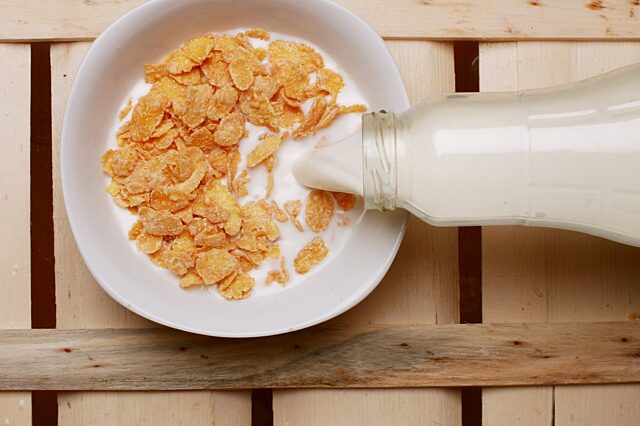Decoding the milk aisle
The milk aisle at supermarkets these days can be intimidating. Long gone are the days of simple dairy; the shelves are now lined with a variety of milk options…

Update your location to show providers, locations, and services closest to you.
Lactose is a type of sugar found in milk and other dairy products. An enzyme called lactase is needed by the body to digest lactose.
Lactose intolerance develops when the small intestine does not make enough of this enzyme.
Lactase deficiency; Milk intolerance; Disaccharidase deficiency; Dairy product intolerance; Diarrhea - lactose intolerance; Bloating - lactose intolerance
Babies' bodies make the lactase enzyme so they can digest milk, including breast milk.
Lactose intolerance is very common in adults. It is rarely dangerous. About 30 million American adults have some degree of lactose intolerance by age 20.
An illness that involves or injures your small intestine may cause less of the lactase enzyme to be made. Treatment of these illnesses may improve the symptoms of lactose intolerance. These may include:
Babies may be born with a genetic defect which may make them unable to make any of the lactase enzyme.
Symptoms often occur 30 minutes to 2 hours after having milk products. Symptoms may be worse when you consume large amounts.
Symptoms include:
Other intestinal problems, such as irritable bowel syndrome, may cause the same symptoms as lactose intolerance.
Tests to help diagnose lactose intolerance include:
Another method may be to challenge a patient with 25 to 50 grams of lactose in water. Symptoms are then assessed using a questionnaire.
A 1 to 2 week trial of a completely lactose-free diet is also sometimes tried.
Cutting down your intake of milk products that contain lactose from your diet most often eases symptoms. Also look at food labels for hidden sources of lactose in nonmilk products (including some beers) and avoid these.
Most people with low lactase level can drink up to one half cup of milk at one time (2 to 4 ounces or 60 to 120 milliliters) without having symptoms. Larger servings (more than 8 ounces or 240 mL) may cause problems for people with lactase deficiency.
Milk products that may be easier to digest include:
You can add lactase enzymes to regular milk. You can also take these enzymes as capsules or chewable tablets. There are also many lactose-free dairy products available.
Not having milk and other dairy products in your diet can lead to a shortage of calcium, vitamin D, riboflavin, and protein. You need 1,000 to 1,500 mg of calcium each day depending on your age and sex. Some things you can do to get more calcium in your diet are:
Symptoms most often go away when you remove milk, other dairy products, and other sources of lactose from your diet. Without dietary changes, infants or children may have growth problems.
If the lactose intolerance was caused by a temporary diarrheal illness, levels of lactase enzyme will return to normal within a few weeks.
Contact your provider if:
There is no known way to prevent lactose intolerance. You can prevent symptoms by avoiding foods with lactose.

Höegenauer C, Hammer HF. Maldigestion and malabsorption. In: Feldman M, Friedman LS, Brandt LJ, eds. Sleisenger and Fordtran's Gastrointestinal and Liver Disease. 11th ed. Philadelphia, PA: Elsevier; 2021:chap 104.
National Institute of Diabetes and Digestive and Kidney Diseases website. Definition & facts for lactose intolerance. www.niddk.nih.gov/health-information/digestive-diseases/lactose-intolerance/definition-facts. Updated February 2018. Accessed August 26, 2022.
Semrad CE. Approach to the patient with diarrhea and malabsorption. In: Goldman L, Schafer AI, eds. Goldman-Cecil Medicine. 26th ed. Philadelphia, PA: Elsevier; 2020:chap 131.

The milk aisle at supermarkets these days can be intimidating. Long gone are the days of simple dairy; the shelves are now lined with a variety of milk options…

Got milk? For some people with lactose intolerance, dairy products don’t have to be off the menu. Lactose intolerance means that a person’s body doesn’t make enough lactase, which means he or she...
Got milk? For some people with lactose intolerance, dairy products don’t have to be off the menu. Lactose intolerance means that a person’s body doesn’t make enough lactase, which means he or she...
Kids love milk. Unfortunately, milk doesn’t always love them back. A condition called...